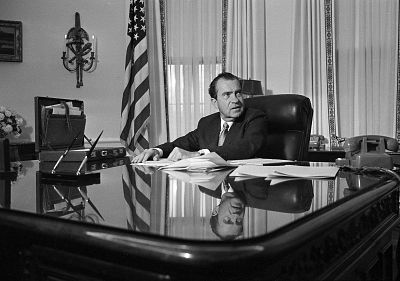The big question may be whether the president already has waived his right to stop Congress from getting the Mueller report.
WASHINGTON — Now that President Donald Trump has asserted executive privilege to withhold Special Counsel Robert Mueller's report and related documents from Congress, it's reasonable to ask just what that means.
Generally speaking, executive privilege is a loosely defined power that allows the president and other executive branch officials to keep information — particularly regarding decision-making deliberations and national security matters — from Congress and the courts.
The Supreme Court has previously ruled that the assertion of privilege creates a "presumption" of authority for the president to block Congress from gaining access to materials, meaning essentially that lawmakers would have to sue the administration to try to force their release. But that power is not absolute.
The House Judiciary Committee was prepared to recommend Wednesday that the full House find Attorney General William Barr in contempt — the step preceding a lawsuit. Democrats on the Judiciary Committee have argued that they need the full, un-redacted Mueller report and underlying documents in order to make determinations on "whether to approve articles of impeachment" against Trump or other officials, "as well as consideration of other steps such as censure or issuing criminal, civil or administrative referrals."
That declaration of their intent could be important because in ruling against a Senate Select Committee's efforts to obtain President Richard Nixon's White House tapes in 1973, the D.C. Circuit Court of Appeals cited a valid ongoing House impeachment process, and the House's possession of the tapes, as a reason to find that the Senate didn't need them for legislative purposes.
While the larger case involving the Nixon tapes is the benchmark battle involving executive privilege, it was mostly centered on whether the president's executive privilege claim could withstand a grand jury subpoena in a criminal case. Ultimately, the Supreme Court ruled 8-0 that Nixon had to turn over his once-secret White House recordings.
Nixon asserted privilege six times, according to the Congressional Research Service, including three times with regard to the tapes. President Bill Clinton's numerous claims were difficult to track because they were not given in writing, according to CRS, while President George W. Bush invoked privilege six times.
In most instances of a clash between Congress and the White House, the two sides reach some sort of agreement that stops short of litigation, and Justice Department officials traded offers of accommodation with the House Judiciary Committee this week before Trump asserted what he described as "protective" privilege just before the panel met to issue its contempt recommendation Wednesday.
On occasion, the White House and Congress duke it out in court. And it's not clear which side — or which constitutional principles — will win out if they lawyer up.
The president's team has been quick to point to what's known as the "Espy" case, which involved former Agriculture Secretary Mike Espy and President Bill Clinton's efforts to shield documents from a grand jury looking into allegations of wrongdoing by Espy.
In that case, which Congress was not engaged in, an appellate court established a two-pronged approach to the executive privilege power, covering "communications" on one hand and "deliberative process" on the other, according to CRS. The bar for compelling the release of presidential communications, including those of White House staff who advise the president — like the White House counsel — was set much higher than that for the "deliberative process" of the executive branch.
But there's another question hanging over all of the discussion — and that is whether Trump waived his right to privilege when he and his aides gave testimony and information contained in the Mueller report to Mueller's team.
The administration's position is clear from the assertion of privilege Wednesday: Trump hasn't waived anything.
But Stephen Truitt, a litigator at the Justice Department under Lyndon Johnson Attorney General Ramsey Clark, said Trump was surrounded by lawyers when he made the decision to let his aides talk to Mueller during the investigation.
"It is extraordinary that his lawyers did not make explicit to Mueller in a letter that a waiver was not intended if they had the slightest doubt about it," Truitt, a grandson of former Vice President Alben Barkley, said in an interview. "I think a court will find the privilege is inapplicable given the waiver."












